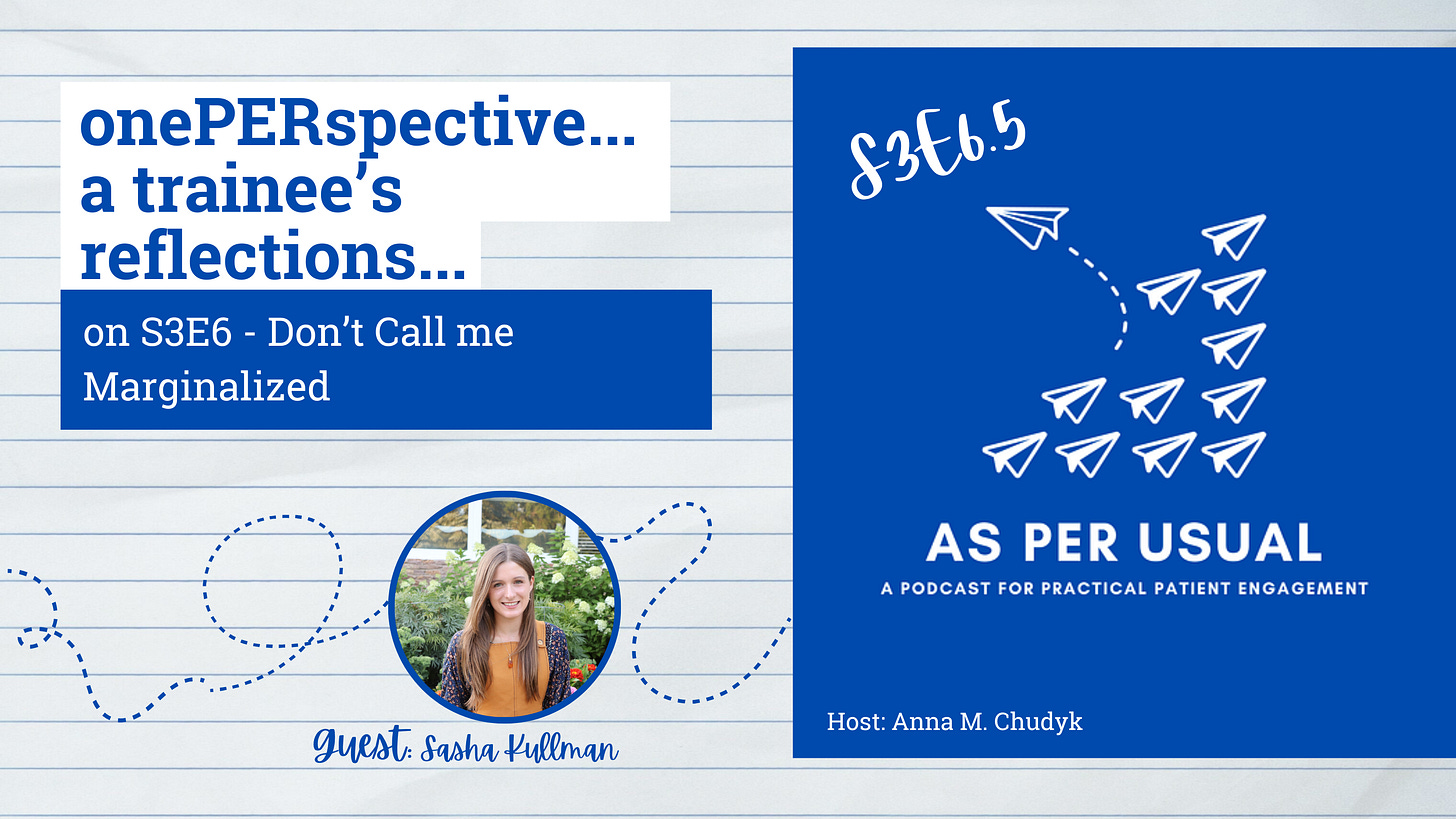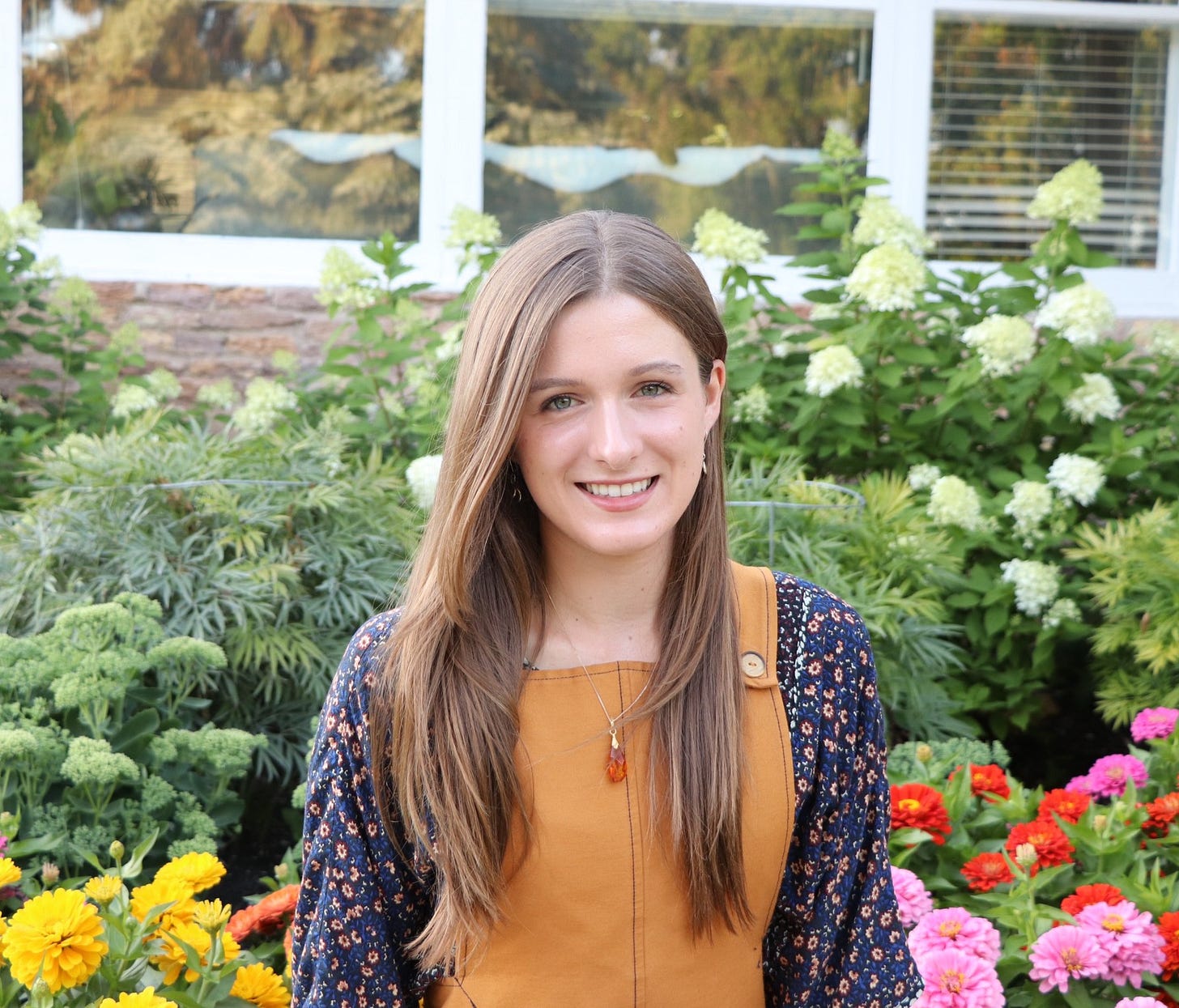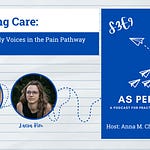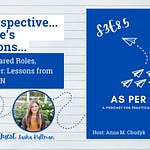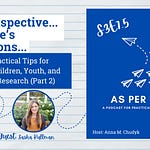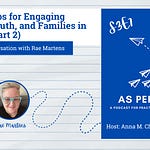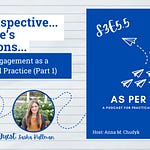Episode summary
In this onePERspective episode of asPERusual, doctoral trainee Sasha Kullman reflects on key take aways from Season 3, Episode 6 of asPERusual, which featured guests Sunday Queskekapow and Brianna Hunt. Sasha emphasizes why framing research around “sensitive topics” — rather than deficit-based terms like “vulnerable” or “marginalized” — shifts power and narrative back to communities. She highlights the ethical imperative of including peer researchers with lived experience, the importance of pre-research relationship building, and the responsibility of academic teams to support peer researchers emotionally, materially, and culturally. The central takeaway: ethical, justice-oriented research requires humility, reciprocity, and creating safe, supportive spaces for both participants and peer researchers.
Meet our guest listener
Sasha Kullman: Sasha is a PhD student in the College of Pharmacy at the University of Manitoba, supervised by Dr. Anna Chudyk. She holds a master’s degree from the Faculty of Kinesiology and Recreation Management at the same institution, where her research focused on health psychology, health promotion, and patient engagement in research. Funded by a CIHR Canada Graduate Scholarship, Sasha’s doctoral work continues to center on participatory approaches, involving patients and their families in research designed to enhance healthcare experiences.
Episode Transcript:
Anna Chudyk:
Hi everyone! Welcome to onePERspective — a bi-weekly segment where a featured guest shares their key reflections on the latest episode of asPERusual, my podcast all about practical patient engagement in research. I’m your host, Anna Chudyk.
Joining me again today is Sasha Kullman, a doctoral trainee in my lab. Sasha, I can’t wait to hear your key takeaways from Season 3, Episode 6 of asPERusual, which focused on engaging youth with lived/living experiences of sensitive topics.
Sasha Kullman:
Hi everyone, and welcome back to asPERusual. I’m Sasha, a doctoral student in the College of Pharmacy at the University of Manitoba, and I’m also Anna’s student! I’m really grateful to be with you again for this mini episode.
My research focuses on patient engagement, and as part of that, I’m lucky to work directly with youth and families. So far I’ve been learning a lot from Season 3.
In our last episode, we heard from two amazing guests; Sunday Queskekapow and Brianna Hunt. Sunday is a Two-Spirit Swampy Cree advocate, peer researcher, Gladue writer, and business owner. Brianna is a researcher and community advocate, as well as the Research Advisory Coordinator for the Children’s Hospital Research Institute of Manitoba. Their conversation focused on engaging youth with lived experience of sensitive topics.
When we say “sensitive topics,” we mean areas of research that involve experiences such as being unhoused, living with substance use, or facing systemic oppression. As Sunday and Brianna explained so well, “sensitive” is a deliberate word choice.
In research, we often hear phrases like “vulnerable” or “marginalized” communities. But as we learned in last week’s episode, that language is deficit-based, it emphasizes challenges rather than the strength and resilience of the people involved. That framing can, even unintentionally, reinforce the very inequities researchers hope to dismantle.
By using “sensitive topics” instead, we shift toward a strengths-based perspective. It puts the power to define the narrative back into the hands of the individuals or communities at the center of the research, letting them decide how they want to be represented. It also serves as a reminder to researchers to treat the subject matter with reverence and respect, and to approach their role with humility, centering lived experience.
Brianna put it powerfully: when you’re researching sensitive topics, it’s not just important to include voices from the community, it’s an ethical imperative. This challenges the status quo in academic research, where the researcher is often centered. For work to truly reflect and benefit the people it’s about, you need community representation to contextualize the issues, ensure findings connect back to community priorities, and support goals defined by that community. This is especially crucial when working with Indigenous communities, as Brianna and Sunday mentioned, where strengths-based approaches, community-driven research, and data sovereignty are essential for ethical practice.
Brianna also highlighted the importance of “pre-research”, the work researchers should do before they even approach a community. It’s our responsibility as researchers to understand context, history, and connection points before seeking partnerships. That might mean extra time, training, or relationship-building up front -- but it’s critical for building trust and respect.
For researchers like me who are new to this space, that can feel daunting because, without lived experience, it’s not always clear where to start. That’s where peer researchers are so vital. Peer researchers are individuals with lived or living experience of the research topic -- or with peer connections to those who do -- who guide projects, help make decisions, ensure participants feel safe, and keep the research community-driven. Their ability to bridge the worlds of lived experience and academic research is essential.
And importantly, like Brianna and Sunday shared, without that perspective, researchers could unintentionally cause harm — not out of malice, but simply because we don’t know what we don’t know. This ties to Brianna’s description of justice-oriented research; research that doesn’t just avoid harm, but actively works toward dismantling inequities. Because how can we dismantle systems of oppression if we’re not listening to the people most affected by them?
Points to Ponder
One thing I’ve been reflecting on since that conversation is the emotional, mental, physical, and even spiritual load peer researchers might need to carry as part of their role. They navigate between two worlds -- the community and the academic team -- and give so much of themselves to the work. That’s a gift.
As academic researchers, we don’t usually have to invest our personal selves in the same way. Which means we have a responsibility: to ensure peer researchers have the resources and support they need to thrive in their roles and have a positive experience throughout the process.
From what Sunday and Brianna described, their teams created an environment where everyone could access support when needed. And that reciprocity — that commitment to being a strong team and leaning on each other, is what sustains safe spaces for both participants and research partners.
Those acts of support could mean being a listening ear for a peer researcher who wants to debrief after a meeting, advocating for generous compensation that demonstrates how the peer researcher’s time is deeply valued, ensuring there are opportunities for involvement across every stage of the research cycle, respecting cultural gifting protocols, offering supports like food or childcare during meetings, and meeting at times and in spaces that work well for the peer researchers or other community members you are engaging with. Some of these supports were also described in the context of working with individuals as research participants, but I think they truly apply across contexts.
So if I were to think about my biggest takeaway from their conversation? If peer researchers are willing to be the safe space for participants, then the rest of the research team can work just as hard to be a safe and to supportive their peer researchers. I think that simple act of being kind and good to each other is so important in every project.
Thanks for spending a few minutes with me today. I’ll see you in the next episode.
Anna:
Thanks Sasha. You always offer such a succinct yet thought-provoking set of key takeaways.
In the next full episode of asPERusual, I continue my conversation with Rae Martens, a knowledge broker with the Family Engagement in Research Program (FER). Rae was just on Season 3, Episode 5 of asPERusual where we engaged in rich conversations about a range of topics, including engagement as a psychosocial practice, the micro-credential courses offered through FER, and patient partners’ evolving identities. The conversation was so rich, in fact, that we ran out of time before we could get to applicable tips for engaging children, youth and families in research, which is the focus of this upcoming episode.
As always please be sure to head over to our website at asperusual.substack.com where you can find previous episodes, check out interactive transcripts, and subscribe to our newsletter. And if you haven’t already, please subscribe to the podcast, and leave a positive review, wherever you like to listen — it really helps others find us too.
You can always reach me directly at anna.asperusual@gmail.com, or connect with me on LinkedIn by searching for Anna M. Chudyk — that’s C-H-U-D-Y-K. You can add Sasha to LinkedIn by searching for Sasha Kullman - K-U-L-L-M-A-N.
Thanks again for listening — and until next time, let’s keep working together to make patient engagement in research the standard… or asPERusual.



